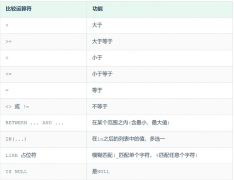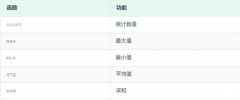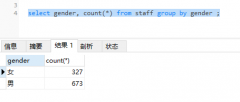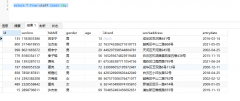PostgreSQL GROUP BY different from MySQL?(PostgreSQL GROUP BY 与 MySQL 不同?)
问题描述
我一直在将我的一些 MySQL 查询迁移到 PostgreSQL 以使用 Heroku.我的大部分查询工作正常,但是当我使用 group by 时,我总是遇到类似的重复错误:<块引用>
错误:列XYZ"必须出现在 GROUP BY 子句中或用于一个聚合函数
有人能告诉我我做错了什么吗?
MySQL 100% 工作:
SELECT `availables`.*从`可用`内部连接`rooms` ON `rooms`.id = `availables`.room_idWHERE(rooms.hotel_id = 5056 AND availables.bookdate BETWEEN '2009-11-22' AND '2009-11-24')GROUP BY availables.bookdateORDER BY availables.updated_at<块引用>
PostgreSQL 错误:ActiveRecord::StatementInvalid: PGError: ERROR: columnavailables.id"必须出现在 GROUP BY 子句中或用于聚合函数:
SELECT "availables".* FROM "availables" INNER在房间"上加入房间".id =可用".room_id WHERE(rooms.hotel_id = 5056 AND availables.bookdate BETWEEN E'2009-10-21'AND E'2009-10-23') GROUP BY availables.bookdate ORDER BYavailables.updated_at
生成 SQL 的 Ruby 代码:expiration = Available.find(:all,:joins =>[ :房间 ],:条件 =>[rooms.hotel_id = ? AND availables.bookdate BETWEEN ? AND ?", hostel_id, date.to_s, (date+days-1).to_s ],:组=>'availables.bookdate',:订单=>'availables.updated_at')<前>+-----+-------+-------+------------+---------+---------------+--------------+|身份证 |价格|斑点|预订日期 |room_id |created_at |更新时间 |+-----+-------+-------+------------+---------+---------------+--------------+|第414话38.0 |1 |2009-11-22 |1762 |2009-11-20... |2009-11-20... ||第415话38.0 |1 |2009-11-23 |1762 |2009-11-20... |2009-11-20... ||第416话38.0 |2 |2009-11-24 |1762 |2009-11-20... |2009-11-20... |+-----+-------+-------+------------+---------+---------------+--------------+3 排成套
预期输出(来自工作 MySQL 查询):
MySQL 完全不符合标准的 GROUP BY 可以被 Postgres 的 DISTINCT ON 模拟.考虑一下:
MySQL:
SELECT a,b,c,d,e FROM table GROUP BY a这会为 a 的每个值提供 1 行(您不知道是哪一个).实际上你可以猜到,因为 MySQL 不知道哈希聚合,所以它可能会使用排序......但它只会对 a 进行排序,所以行的顺序可能是随机的.除非它使用多列索引而不是排序.好吧,无论如何,它不是由查询指定的.
Postgres:
SELECT DISTINCT ON (a) a,b,c,d,e FROM table ORDER BY a,b,c这会为 a 的每个值提供 1 行,该行将是根据查询指定的 ORDER BY 排序的第一行.简单.
请注意,这里不是我正在计算的聚合.所以 GROUP BY 实际上没有意义.DISTINCT ON 更有意义.
Rails 与 MySQL 结合,所以我对它生成的 SQL 在 Postgres 中不起作用并不感到惊讶.
I've been migrating some of my MySQL queries to PostgreSQL to use Heroku. Most of my queries work fine, but I keep having a similar recurring error when I use group by:
ERROR: column "XYZ" must appear in the GROUP BY clause or be used in an aggregate function
Could someone tell me what I'm doing wrong?
MySQL which works 100%:
SELECT `availables`.*
FROM `availables`
INNER JOIN `rooms` ON `rooms`.id = `availables`.room_id
WHERE (rooms.hotel_id = 5056 AND availables.bookdate BETWEEN '2009-11-22' AND '2009-11-24')
GROUP BY availables.bookdate
ORDER BY availables.updated_at
PostgreSQL error:
ActiveRecord::StatementInvalid: PGError: ERROR: column "availables.id" must appear in the GROUP BY clause or be used in an aggregate function:
SELECT "availables".* FROM "availables" INNER JOIN "rooms" ON "rooms".id = "availables".room_id WHERE (rooms.hotel_id = 5056 AND availables.bookdate BETWEEN E'2009-10-21' AND E'2009-10-23') GROUP BY availables.bookdate ORDER BY availables.updated_at
Ruby code generating the SQL:
expiration = Available.find(:all,
:joins => [ :room ],
:conditions => [ "rooms.hotel_id = ? AND availables.bookdate BETWEEN ? AND ?", hostel_id, date.to_s, (date+days-1).to_s ],
:group => 'availables.bookdate',
:order => 'availables.updated_at')
Expected Output (from working MySQL query):
+-----+-------+-------+------------+---------+---------------+---------------+ | id | price | spots | bookdate | room_id | created_at | updated_at | +-----+-------+-------+------------+---------+---------------+---------------+ | 414 | 38.0 | 1 | 2009-11-22 | 1762 | 2009-11-20... | 2009-11-20... | | 415 | 38.0 | 1 | 2009-11-23 | 1762 | 2009-11-20... | 2009-11-20... | | 416 | 38.0 | 2 | 2009-11-24 | 1762 | 2009-11-20... | 2009-11-20... | +-----+-------+-------+------------+---------+---------------+---------------+ 3 rows in set
MySQL's totally non standards compliant GROUP BY can be emulated by Postgres' DISTINCT ON. Consider this:
MySQL:
SELECT a,b,c,d,e FROM table GROUP BY a
This delivers 1 row per value of a (which one, you don't really know). Well actually you can guess, because MySQL doesn't know about hash aggregates, so it will probably use a sort... but it will only sort on a, so the order of the rows could be random. Unless it uses a multicolumn index instead of sorting. Well, anyway, it's not specified by the query.
Postgres:
SELECT DISTINCT ON (a) a,b,c,d,e FROM table ORDER BY a,b,c
This delivers 1 row per value of a, this row will be the first one in the sort according to the ORDER BY specified by the query. Simple.
Note that here, it's not an aggregate I'm computing. So GROUP BY actually makes no sense. DISTINCT ON makes a lot more sense.
Rails is married to MySQL, so I'm not surprised that it generates SQL that doesn't work in Postgres.
这篇关于PostgreSQL GROUP BY 与 MySQL 不同?的文章就介绍到这了,希望我们推荐的答案对大家有所帮助,也希望大家多多支持编程学习网!
本文标题为:PostgreSQL GROUP BY 与 MySQL 不同?


- 如何将 Byte[] 插入 SQL Server VARBINARY 列 2021-01-01
- 导入具有可变标题的 Excel 文件 2021-01-01
- 在SQL中,如何为每个组选择前2行 2021-01-01
- 更改自动增量起始编号? 2021-01-01
- SQL 临时表问题 2022-01-01
- 以一个值为轴心,但将一行上的数据按另一行分组? 2022-01-01
- 远程 mySQL 连接抛出“无法使用旧的不安全身份验证连接到 MySQL 4.1+"来自 XAMPP 的错误 2022-01-01
- 如何使用 pip 安装 Python MySQLdb 模块? 2021-01-01
- 使用 Oracle PL/SQL developer 生成测试数据 2021-01-01
- 如何将 SonarQube 6.7 从 MySQL 迁移到 postgresql 2022-01-01









